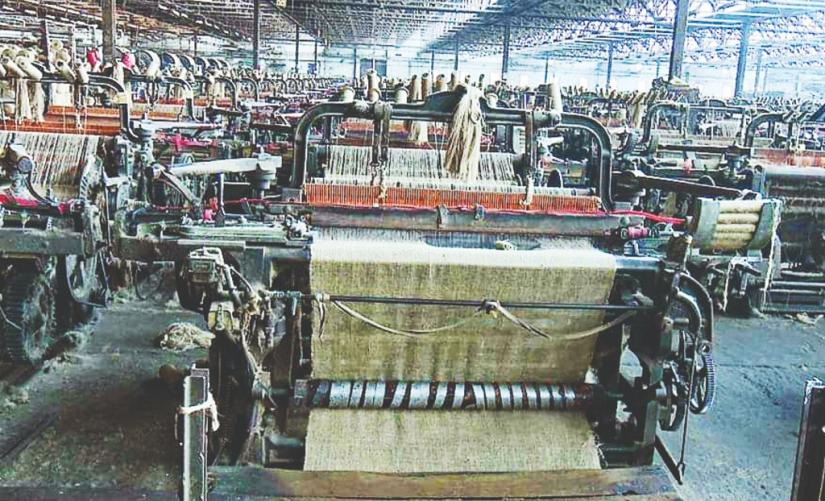 Lack of raw jute has forced 1,914 handlooms in nine nationalized jute factories across Khulna and Jessore to shut down, which in turn has caused lower production among the state-run jute factories.
Lack of raw jute has forced 1,914 handlooms in nine nationalized jute factories across Khulna and Jessore to shut down, which in turn has caused lower production among the state-run jute factories.
Upon investigation yesterday, it was found that stock of raw jute at Khalishpur’s Star Jute Mill remains only for six days, while Eastern Mill’s raw jute stock will run for as long as for ten days.
Fall in international demand for jute and jute goods has also affected the factories in the region, as Tk 2.9 billion worth of jute products remain unsold to date.
If the situation persists, export earnings from the sector would falter, experts said.
Factory workers have already started to hold strikes to press home their demands, which included clearing unpaid wages, implementation of wage commission and modernizing the state-run jute mills to coup with the present context of global market.
Economist Prof Anwarul Quadir said the inability to purchase raw jute and not being able to sell-off jute products on time are two of the biggest challenges the jute mills in Khulna, Jessore and elsewhere encounter now.
“The demand of jute sacks in the international market has also gone down,” he observed, “This is why the factories must produce goods which are contextual and in demand.”
It was found that to diversify the use of jute products, the district’s Crescent Jute Mill had started producing laminated bags. Although it was initially profitable, negligence from the authorities forced production to cease after a few months.
Entrepreneurs demanded making the use of jute-made laminated bags and product packaging mandatory, if the industry is to sustain in the long run.
The Jute Research Institute had recently taken 10 initiatives, including production of yarn made out of jute and wool, as part of its innovation practices.
Other initiatives include finding more technology to enhance jute diversification, binding it for commercial gains, developing the quality of existing jute goods and other steps.
According to Bangladesh Jute Mills Corporation (BJMC) data, there are currently 100,309 tons of jute products lying stockpiled at nine jute factories across Khulna and Jessore region, the market value of which is Tk 2.9 billion.
Khalid Hossain, general secretary of Jute and Jute Industry Preservation Committee, said the negligence of BJMC has caused huge stockpiling of jute goods in the factories.
“They cannot find international buyers for their goods, and also waste time pondering over price negotiations, which often leads to further fall in international demand,” he opined.
Md Sohrab Hossain, general secretary of Crescent Jute Mills’ collective bargaining agents (CBA), said the delay in purchasing raw jute is forcing factories to incur more losses.
“Lack of funds often forces the factory owners to purchase the same raw jute per maund later at Tk800-1,000 more than the usual rates,” he said, “This subsequently increases the production costs.”
Habibur Rahman, a worker of the same factory, lamented for not getting his wages for the last seven months. Workers of eight other factories echoed the similar sentiments.
Project Head of Crescent Jute Mills Gazi Shahadat Hossain said they had not received any funds from the government to purchase raw jute for the last two years.
Sheik Rahmatullah, liaison officer of BJMC’s Khulna office, said the issues, including workers’ protests, have all been conveyed to higher authorities in Dhaka, who will take remedial measures soon.
District’s jute workers go on strike
The workers of nine state-owned jute mills—in Khulna and Jessore—have gone on a 24-hour strike starting at 6am yesterday to press home their demands including clearing arrear salaries.
The mills have ceased production for the time being.
Platinum Jute Mill workers’ leader, Khalilur Rahman, confirmed the incident and said: “A strike is in effect. The workers have presented a nine-point demand. These include: the clearance of outstanding wages, a wage commission, gratuities, provident fund payments, and making casual workers permanent.”
He said workers from the Crescent, Platinum, Khalishpur, Daulatpur, Star, Alim, and Eastern mills joined the protest.
Labour leader of the protest Md Sohrab Hossain said: “We are protesting to realise our nine-point demand.”
Around 50,000 workers of nine state-owned jute mills—of Khulna and Jessore—staged a protest at Khalishpur New Market Road, on Sunday to press home their nine-point demand.
As part of their protests, the workers will hold a 48-hour strike on March 19, and a meeting in Dhaka on March 24, where they will announce their next course of action.
Narsingdi jute workers also go on strike
Workers of two jute factories under Bangladesh Jute Mills Corporation began a 24-hour strike from yesterday, as part of their programs to realize their demands including clearing unpaid wages, implementation of wage commission and others.
The workers of UMC Jute Mills in Narsingdi and Bangladesh Jute Mills in Ghorashal began their 24-hour strike from 6am yesterday, effectively stopping production at the jute factories for 24 hours.
The strike was called by Bangladesh Jute Mills Sramik League, who demonstrated in front of both the factory entrance gates and staged protest rallies.
Safiul Islam Molla, president of UMC Jute Mills Workers’ Union, said several month-long campaigns were held in the past to realize their demands, which included unpaid wages of workers, clearing their gratuity payments, form a wage commission which was pledged by Prime Minister Sheikh Hasina.
He said if the demands are not met this time, then the central workers’ union committee in Dhaka will stage another nationwide 48 hour strike in all jute factories across the country, as well as other tough movement.
Among others, Kamal Hossain, general secretary of collective bargaining agents (CBAs), former CBA president Anisur Rahman, worker leader Kaiser Khan and more union leaders were present at the demonstration.
 Business
Business
30892 hour(s) 15 minute(s) ago ;
Evening 11:10 ; Thursday ; Apr 25, 2024
Problems plague state-run jute mills
Send
Md Hedait Hossain Molla, Khulna
Published : 18:33, Mar 13, 2019 | Updated : 18:40, Mar 13, 2019
Published : 18:33, Mar 13, 2019 | Updated : 18:40, Mar 13, 2019
0 ...0 ...
/pdn/hm/
Topics: Top Stories
- KOICA donates medical supplies to BSMMU
- 5 more flights to take back British nationals to London
- Covid19: Rajarbagh, Mohammadpur worst affected
- Momen joins UN solidarity song over COVID-19 combat
- Covid-19: OIC to hold special meeting
- WFP begins food distribution in Cox’s Bazar
- WFP begins food distribution in Cox’s Bazar
- 290 return home to Australia
- Third charter flight for US citizens to return home
- Dhaka proposes to postpone D8 Summit
Unauthorized use of news, image, information, etc published by Bangla Tribune is punishable by copyright law. Appropriate legal steps will be taken by the management against any person or body that infringes those laws.
Bangla Tribune is one of the most revered online newspapers in Bangladesh, due to its reputation of neutral coverage and incisive analysis.
F R Tower, 8/C Panthapath, Shukrabad, Dhaka-1207 | Phone: 58151324; 58151326, Fax: 58151329 | Mob: 01730794527, 01730794528






